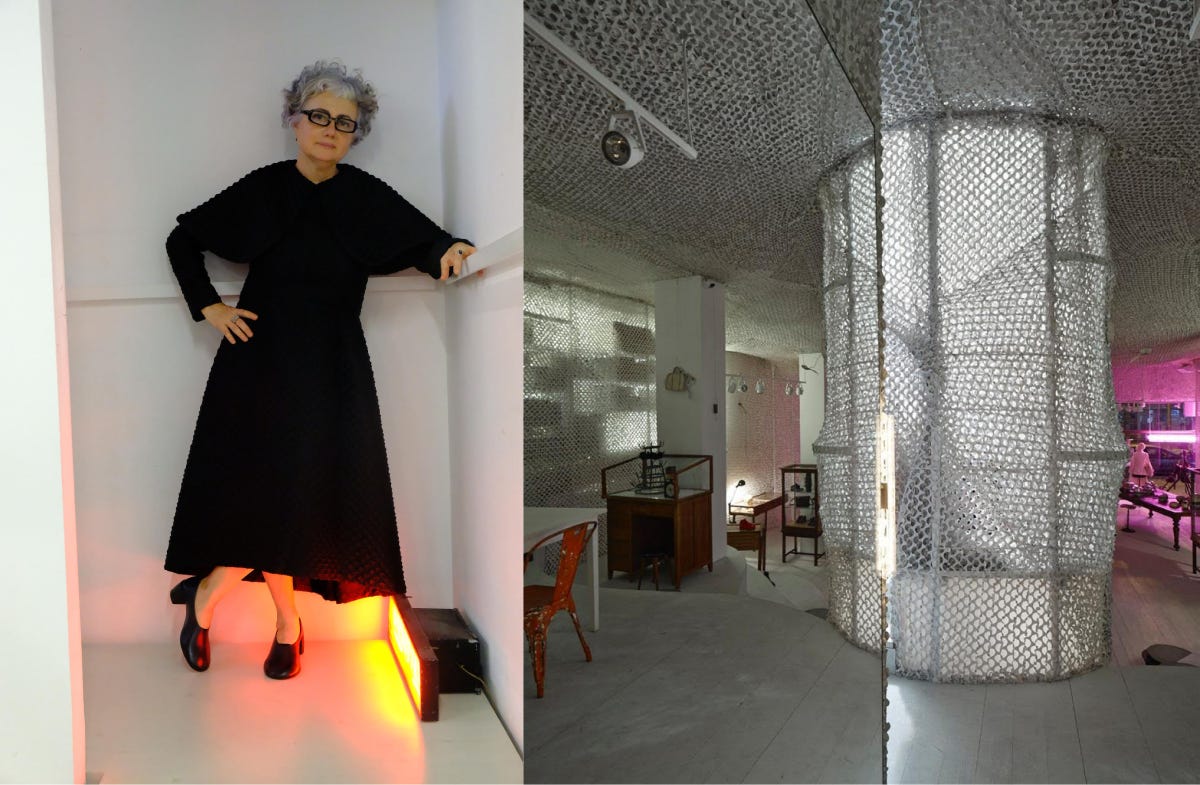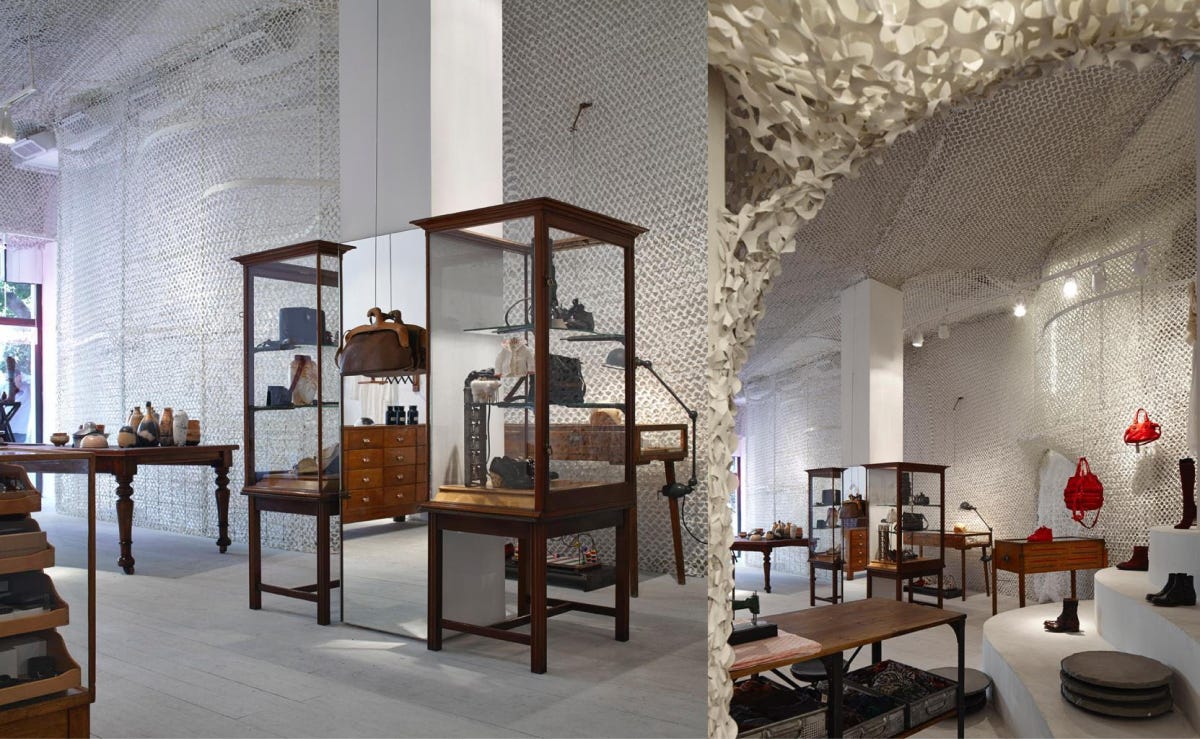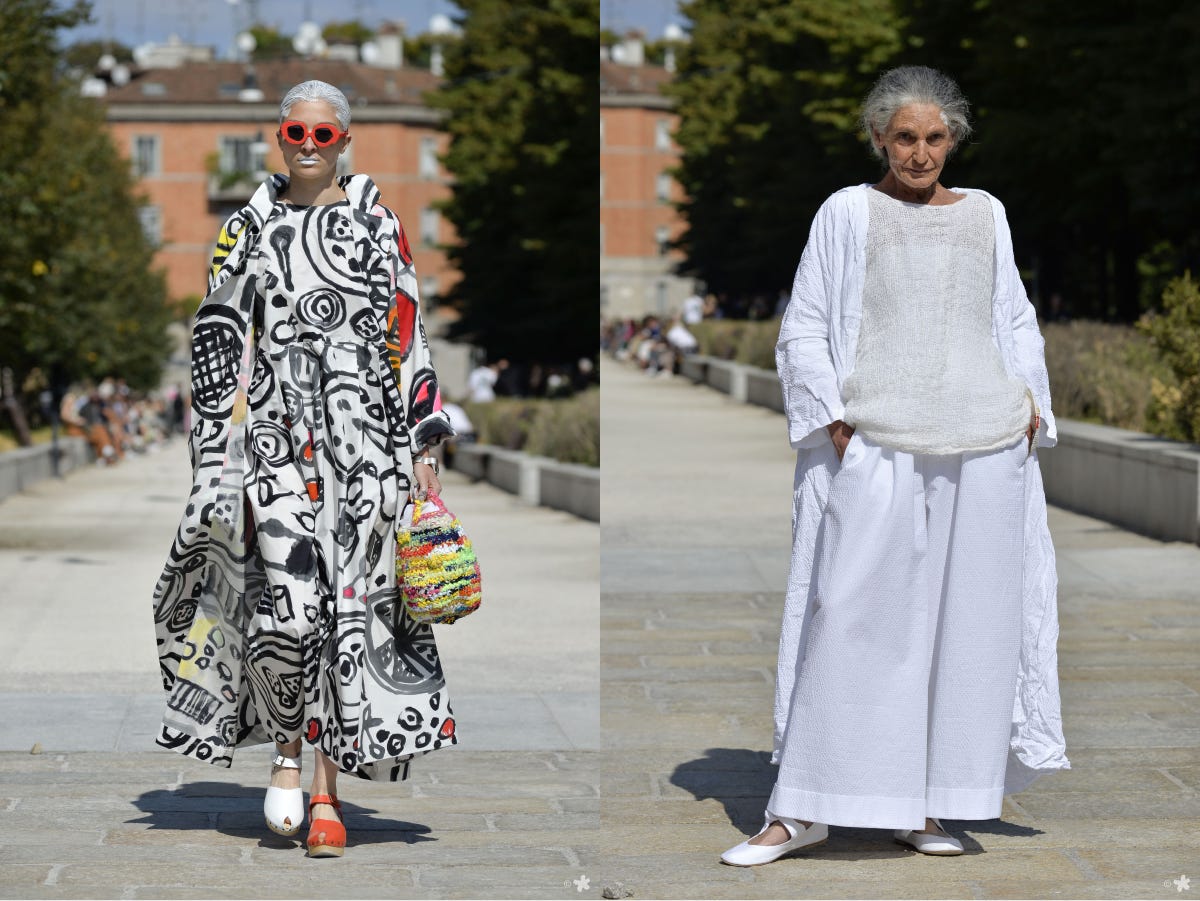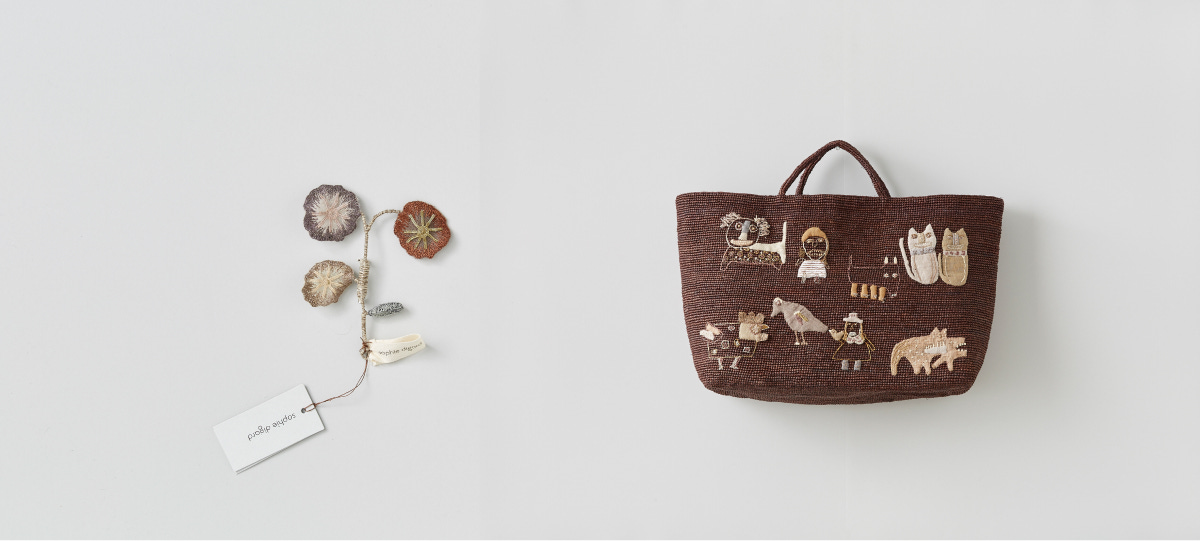FABLAB TLV: the most secret fashion spot in Tel Aviv
An appointment-only store with curated alternative fashion from Europe and Japan

“Good morning Julia, this is Diana from FABLAB TLV :)”. This was the beginning of the message in my Instagram DMs, which I received one morning. “If you are in Tel Aviv now, I invite you to meet. Much in common, including Nina Donis. ♥️🔵🟨”
By that time, Nina Donis clothes were frequent in my feed. And thanks to their remarkable light poplin garments, I ended up in the most secret fashion boutique in Tel Aviv.
Fashion in Tel Aviv is not striking as in major fashion capitals. It must be sought after, and you have to know where to go (that's why this Substack came about). Still, I could not have imagined that such a place existed here, and that sophisticated, expensive, niche fashion – fashion for a very advanced user – has been in demand here for 20 years. That's how long FABLAB TLV has existed, founded by a couple, Diana and Daniel Churges.
You can get into FABLAB TLV only by making an appointment – a retail style that often irritates people. I witnessed several times from inside the store how curious pedestrians tried to be let in by knocking on the glass door. But Diana is firm: you can’t just enter from the street. Behind a door with a WhatsApp phone number written on it, in semi-darkness among antique furniture, there hangs a new collection of intricate pieces by BLACK Comme des Garcons, uniquely tailored dresses with exquisite prints by Daniela Gregis, Christian Peau’s hand-dyed lightweight dresses, an entire line of Marsèll shoes and a dozen more of very rare brands from Italy, Austria, Germany, and Japan. Everything is of exceptional quality, and not a single loud label to be found.
How did the idea of FABLAB TLV come about?
I had a design studio that did corporate identity, mainly for IT firms and funders that invested in IT. Dani (Diana's husband and FABLAB TLV partner) gave me business advice at the time. He was approached by a woman who wanted to open a shoe store and needed a design. This was about 20 years ago.
The store opened on Dizengoff Street. It was a difficult period back then. There were terrorist attacks, buses exploded here every week. Nothing was selling.
At some point, she offered that Dani and I take on the store. I said, “Dani, are you out of your mind? I have a studio, I graduated from [Jerusalem college] Bezalel not to do sales.” For me, “sale” was a dirty word. But Dani persuaded me. He said: “With the studio, you are always in Israel. You don’t go anywhere, you remain in your bubble. It’s time to expand horizons a little.”
How did you decide what to bring?
We thought that we should offer an alternative [to what you could buy in Israel], but we did not test this model and did not know how it would go. We just wanted to show that there was something else available.
How did you find brands?
I had a buzzword I used – cutting edge – and so I searched and found. At first, I only found brands on the Internet. Then I noticed that this is a closed microcosm, where one brand talks about another, and that it is important for them to be in a certain atmosphere, sharing space with other brands that fit their own concept.
When I contacted them, they asked me a lot of questions. They wanted to be sure that they were meeting with the right person who understands the material. I had to pass this “exam” every time. At a certain stage, I told myself that if I have to pass the exam, then I too must meticulously select clients, because I am a representative of these designers. So the idea of personal appointments was born. Clients should be prepared, because my brands do not work like luxury brands, with mass campaigns and buyers who mainly buy the name, not the product. Here you buy a product, an idea, an original thing – you invest in it like in art.
What was the first brand?
The first was Rundholz, it was very radical back then. We found them unexpectedly. We went to Dusseldorf for a shoe show, and found nothing interesting there, and I said to Dani: “Let's just walk around the streets, maybe we will find something.” And we found Rundholz. The store looked like a TATE Gallery, and was a huge space – we were completely shocked by what we saw. I turned to the saleswoman, said that we were from Israel, and asked how I could talk to the designer. She said, "We have certain dates, it's not possible right now." Then we acted like real Israelis: when we are not allowed to enter through the door, we enter through the window (laughs). Within ten minutes a driver arrived in a huge Mercedes and drove us straight to their house. It turned out that it was Carsten’s (one of the co-founders) birthday that day. Despite this, they invited us, and we have been working with them for almost 20 years now.
Who were the first customers?
The first customers were women aged 45 and over. Very strong, independent, and usually from creative fields. A lot of psychologists and lawyers, and even today, this has not changed.
When did you become appointment-only?
Our sales director decided to leave. My studio was shrinking due to changes in IT. At the same time, each season, the product became more and more complex, more expensive, and for a very narrow audience. I really wanted to break away from the idea of a boutique format, which suppressed me. This space [Dizengoff 255, where FABLAB TLV is now located] was vacant. It was a big investment, but we believed that we were making the right move.
When was this?
Ten years ago. After covid, when there was a gap between online and offline, real experience and digital experience, it became obvious to everyone that such a personal service has a meaning. They understood its value, its price. Bottom line – we are happy.
How did it affect the business?
Surprisingly, the first year when we became appointment only was the best. I didn’t have an Instagram or Facebook for a long time, people just came to us.
Is it customary among your customers to show labels, talk about how much they spent, where they bought it?
No. Even the name of the designer is not so important. But the story is important, to know how a garment was created, what idea is behind it, what materials used, the designer’s world. When our client buys, she looks at herself, at how much this garment can support her, improve the quality of her life everyday, and not just some rare evenings.
If a brand has an amazing product, but it’s hyped, can such a brand be found in FABLAB TLV?
No.
So hype is a dealbreaker?
Hype is a dealbreaker because it's a temporary thing. Our clients say that clothes live with them for years, and they do not get bored. In general, fashion or hype for me are not abusive words, it is just a reflection of the world today. This is also very important – to be modern, not to deal only with the classics. But when it comes to collaborations of various huge brands, such as Balenciaga, or even Jil Sander, I personally may like them, but I will not bring them here.
Which of your brands is the rarest and most intricate?
I try to bring the garments which have deep meaning but look very, very simple.
Is it also due to local consumer culture?
Life in Israel is very saturated, very difficult. So the Israeli style tends to lean towards simplification and less formality. Intricate things look much better in Europe or in fashion-forward cities like New York or Tokyo, where they look normal, natural even. In Israel, they do not look organic, because here, everyone is trying to simplify everything. And the things that work actually look very, very simple, but they have subtle nuances either in the material, or in the shape, or in the color. These are the things I try to find, and they are very hard to find, because intricate things are much easier to create.
Please give examples of such apparent simplicity.
Well, here is the enigmatic Daniela Gregis. Her clothes are like a verse of five lines: simple words, with very deep thoughts behind them. Or as “childish” drawings of the late Picasso. This is the secret of Daniela Gregis: you can't copy her, her clothes look so easy and childish, like it's elementary work. But there is so much thought, labor, warmth, love and poetry invested there that people usually feel it on the emotional level.
Or Suzusan. The designer lives in Germany and his family lives in Japan. Theirs is the third generation that deals with the shibori technique involving manual tie-dyeing. These are good materials, with minimalist forms, but the colors and the technique itself turn the product into a very artistic, exclusive, and expressive one.
Do you follow mainstream fashion ?
Yes, sure. I follow everything, I even follow ZARA, which is a reflection of the market.
What was in Israel before ZARA?
In the 1990s, there was a rise of Israeli designers, which was associated with the rise of [Tel Aviv college] Shenkar and the opening of the fashion department at [Jerusalem college] Bezalel. They graduated, and they wanted to show themselves and their work. Throughout Dizengoff street, there were new beautiful shops of Israeli designers popping up – this was before Zara, Mango, and H&M. The fast-fashion revolution hadn't happened yet.
Was this during the aughts?
Yes, in the 2000s, fast fashion entered the Israeli market. Israeli designers could no longer sell at the same prices because the competition was crazy, and they had to cut prices or close down. Those who didn't want to close realized that the money is in the weddings.
I understand that increased attention to the wedding is a kind of cultural code.
It's not just weddings, it can be a bar mitzvah. Women believe that at such a moment they should look different, and there is a desire to invest in an outfit. People come to me for this too, but for me this is the least interesting moment from a professional point of view, because this is a one-time purchase, and I noticed that women do not return after that.
I remember how women came to us and said: “Now, if I had a wedding, I would buy it at that price, but not for every day.” And many years passed until we realized that we need to live every day – a woman should feel good every day, and not just on the day when she is under the chuppah of her daughter or son. Our audience has always understood this, but it was not legit to buy an everyday item for a few thousand shekels.
5 short questions to Diana Churges:
– Where to eat in Tel Aviv?
– Miznon by Eyal Shani, at the bar. Simple delicious food, music and mood, this is Tel Aviv.
– What's your favorite secret spot in Tel Aviv?
– FABLAB TLV.
– Your bestseller?
– Crispy Cotton Simple Top by Casey Casey. No season without it!
– Your favorite item at FABLAB TLV this season?
– Unique Print Cotton Bermuda Pants by Daniela Gregis. I collect them for myself every season.
– Favorite month in Tel Aviv?
– April, everything is in bloom and it's the best weather of the year.






